Breaking Light: The Language and Landscape of Transformation
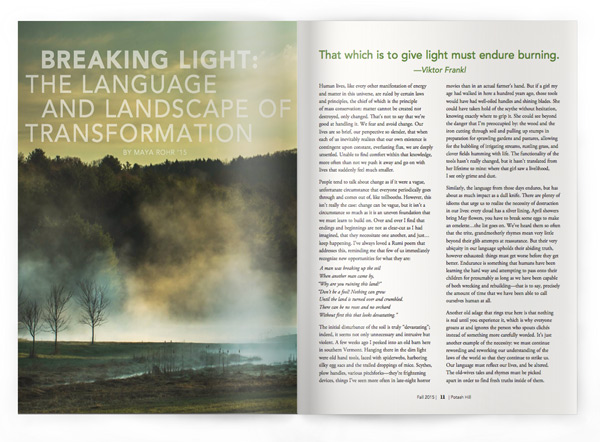
By Maya Rohr ‘15
That which is to give light must endure burning. —Viktor Frankl
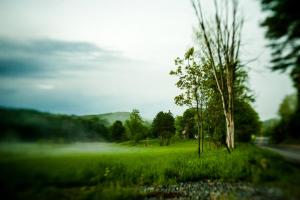 Human lives, like every other manifestation of energy and matter in this universe, are ruled by certain laws and principles, the chief of which is the principle of mass conservation: matter cannot be created nor destroyed, only changed. That’s not to say that we’re good at handling it. We fear and avoid change. Our lives are so brief, our perspective so slender, that when each of us inevitably realizes that our own existence is contingent upon constant, everlasting flux, we are deeply unsettled. Unable to find comfort within that knowledge, more often than not we push it away and go on with lives that suddenly feel much smaller.
Human lives, like every other manifestation of energy and matter in this universe, are ruled by certain laws and principles, the chief of which is the principle of mass conservation: matter cannot be created nor destroyed, only changed. That’s not to say that we’re good at handling it. We fear and avoid change. Our lives are so brief, our perspective so slender, that when each of us inevitably realizes that our own existence is contingent upon constant, everlasting flux, we are deeply unsettled. Unable to find comfort within that knowledge, more often than not we push it away and go on with lives that suddenly feel much smaller.
People tend to talk about change as if it were a vague, unfortunate circumstance that everyone periodically goes through and comes out of, like tollbooths. However, this isn’t really the case: change can be vague, but it isn’t a circumstance so much as it is an uneven foundation that we must learn to build on. Over and over I find that endings and beginnings are not as clear-cut as I had imagined, that they necessitate one another, and just… keep happening. I’ve always loved a Rumi poem that addresses this, reminding me that few of us immediately recognize new opportunities for what they are:
A man was breaking up the soil
When another man came by,
“Why are you ruining this land?”
“Don’t be a fool! Nothing can grow
Until the land is turned over and crumbled.
There can be no roses and no orchard
Without first this that looks devastating.”
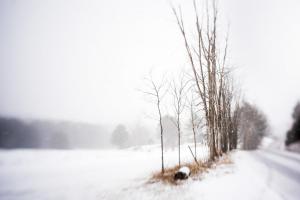 The initial disturbance of the soil is truly “devastating”; indeed, it seems not only unnecessary and intrusive but violent. A few weeks ago I peeked into an old barn here in southern Vermont. Hanging there in the dim light were old hand tools, laced with spiderwebs, harboring silky egg sacs and the trailed droppings of mice. Scythes, plow handles, various pitchforks—they’re frightening devices, things I’ve seen more often in late-night horror movies than in an actual farmer’s hand. But if a girl my age had walked in here a hundred years ago, those tools would have had well-oiled handles and shining blades. She could have taken hold of the scythe without hesitation, knowing exactly where to grip it. She could see beyond the danger that I’m preoccupied by: the wood and the iron cutting through soil and pulling up stumps in preparation for sprawling gardens and pastures, allowing for the bubbling of irrigating streams, rustling grass, and clover fields humming with life. The functionality of the tools hasn’t really changed, but it hasn’t translated from her lifetime to mine: where that girl saw a livelihood, I see only grime and dust.
The initial disturbance of the soil is truly “devastating”; indeed, it seems not only unnecessary and intrusive but violent. A few weeks ago I peeked into an old barn here in southern Vermont. Hanging there in the dim light were old hand tools, laced with spiderwebs, harboring silky egg sacs and the trailed droppings of mice. Scythes, plow handles, various pitchforks—they’re frightening devices, things I’ve seen more often in late-night horror movies than in an actual farmer’s hand. But if a girl my age had walked in here a hundred years ago, those tools would have had well-oiled handles and shining blades. She could have taken hold of the scythe without hesitation, knowing exactly where to grip it. She could see beyond the danger that I’m preoccupied by: the wood and the iron cutting through soil and pulling up stumps in preparation for sprawling gardens and pastures, allowing for the bubbling of irrigating streams, rustling grass, and clover fields humming with life. The functionality of the tools hasn’t really changed, but it hasn’t translated from her lifetime to mine: where that girl saw a livelihood, I see only grime and dust.
Similarly, the language from those days endures, but has about as much impact as a dull knife. There are plenty of idioms that urge us to realize the necessity of destruction in our lives: every cloud has a silver lining, April showers bring May flowers, you have to break some eggs to make an omelette…the list goes on. We’ve heard them so often that the trite, grandmotherly rhymes mean very little beyond their glib attempts at reassurance. But their very ubiquity in our language upholds their abiding truth, however exhausted: things must get worse before they get better. Endurance is something that humans have been learning the hard way and attempting to pass onto their children for presumably as long as we have been capable of both wrecking and rebuilding—that is to say, precisely the amount of time that we have been able to call ourselves human at all.
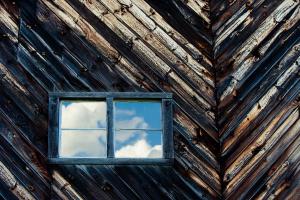 Another old adage that rings true here is that nothing is real until you experience it, which is why everyone groans at and ignores the person who spouts clichés instead of something more carefully worded. It’s just another example of the necessity: we must continue rewording and reworking our understanding of the laws of the world so that they continue to strike us. Our language must reflect our lives, and be altered. The old-wives tales and rhymes must be picked apart in order to find fresh truths inside of them.
Another old adage that rings true here is that nothing is real until you experience it, which is why everyone groans at and ignores the person who spouts clichés instead of something more carefully worded. It’s just another example of the necessity: we must continue rewording and reworking our understanding of the laws of the world so that they continue to strike us. Our language must reflect our lives, and be altered. The old-wives tales and rhymes must be picked apart in order to find fresh truths inside of them.
When I was 15, I began to suffer from debilitating panic attacks. My mother comforted me one night as I trembled and sobbed at the kitchen counter. Stroking my hair, she murmured to me, “We’re cut from the same cloth.” I was not reassured. I became angry, and cried out and pushed her hands away. I thought, How could something so meaningless help me? Even worse, taken literally it meant that my mother was just as weak and vulnerable as I was—that she was just as helpless in the face of my terror. I shut her out, and the panic continued to shudder through me.
Years later, after therapists, drugs, and support groups had begun to ease the paranoia, I began to grasp the intention behind my mother’s attempt at comfort. She was right; we were cut from the same cloth, in a way. As we sat together in the dark kitchen, with cups of tea she had made for us untouched and no longer steaming, she had been trying to tell me that my fear had been hers once. If only I had been able to look beyond my own terror that night and see my mother the way she saw herself: a scarred woman who had fought off the demons of her childhood and refused to succumb. If only I could have looked at her and seen not my weakness, but her strength.
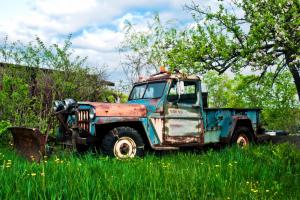 So here I am, still. Here we are. All of our hopes, our fears, our annoyances and apologies laid out before us. We change, this we know. The scythe blade is forged, tempered, polished, used, abandoned, rusted, and polished once again. I am no different. In winter I trudge up the same hills I rolled down in the summer. I cut my hair and it grows long, and I call my mother to tell her I miss her. The glaciers that formed these fields have receded and cracked away from themselves, leaving gemstones and crushed ravines in their wake. Let us repeat ourselves and be ignored, just as the world repeats its miraculous laws unnoticed. We will keep on spouting clichés, old as they are. Our children will not understand, until they do.
So here I am, still. Here we are. All of our hopes, our fears, our annoyances and apologies laid out before us. We change, this we know. The scythe blade is forged, tempered, polished, used, abandoned, rusted, and polished once again. I am no different. In winter I trudge up the same hills I rolled down in the summer. I cut my hair and it grows long, and I call my mother to tell her I miss her. The glaciers that formed these fields have receded and cracked away from themselves, leaving gemstones and crushed ravines in their wake. Let us repeat ourselves and be ignored, just as the world repeats its miraculous laws unnoticed. We will keep on spouting clichés, old as they are. Our children will not understand, until they do.
Maya Rohr graduated in May with a Plan of Concentration in ceramics & American literature, specifically a meditation on domesticity and loss in the work of Emily Dickinson and Marilynne Robinson. She was elected by her peers as the senior speaker at their commencement, and you can find her moving comments about Marlboro and the importance of honest discourse here. Photos by Kelly Fletcher
Making Sense of Loss
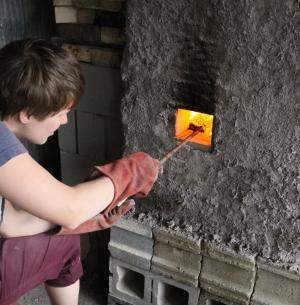 “Place is integral to the art I make, but it is my relationship to place and all that is entangled in it that makes my work,” says Liza Mitrofanova ’15. The biology portion of Liza’s Plan of Concentration focused on the intricate relationship between plants, soil bacteria called rhizobia, and mycorrhizal fungi, including a pilot field study on the college farm. But her art is all about the slow, inexorable process of loss—loss of her childhood memories from growing up in Russia, some of her native language, even parts of her family. Liza’s ceramics installation included giant, melting blocks of ice harvested from the fire pond. “Handing over this work to processes outside of my control is an attempt to recreate the experience of loss and to make sense of it somehow. It embraces impermanence and embodies the notion that loss is change and from change comes growth.”
“Place is integral to the art I make, but it is my relationship to place and all that is entangled in it that makes my work,” says Liza Mitrofanova ’15. The biology portion of Liza’s Plan of Concentration focused on the intricate relationship between plants, soil bacteria called rhizobia, and mycorrhizal fungi, including a pilot field study on the college farm. But her art is all about the slow, inexorable process of loss—loss of her childhood memories from growing up in Russia, some of her native language, even parts of her family. Liza’s ceramics installation included giant, melting blocks of ice harvested from the fire pond. “Handing over this work to processes outside of my control is an attempt to recreate the experience of loss and to make sense of it somehow. It embraces impermanence and embodies the notion that loss is change and from change comes growth.”
